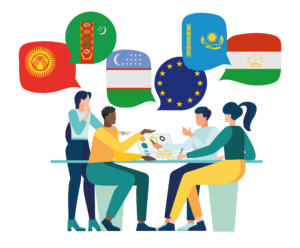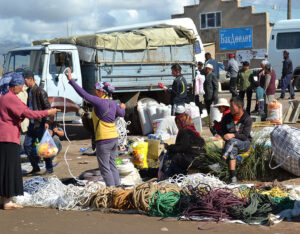Democracy in Central Asia: Sowing in unfertile fields?

Introduction
Central Asia is one of the most repressive regions in the world. Compared with the two other former-Soviet regions of Eastern Europe (Belarus, Moldova and Ukraine) and the South Caucasus (Armenia, Azerbaijan and Georgia), Central Asia shows the least inclination towards democratisation. Although the five Central Asian republics are very different from each other none can be labelled a democracy or even claim to have made substantial progress towards democratic practices.
The European Union (EU) in its 2007 Strategy for Central Asia set out to promote democracy, human rights, rule of law and good governance. The EU is active in urging Central Asian regimes to respect human rights, has set up a regional Rule of Law Initiative and runs several projects focusing on good governance, but so far has not been able to advance in any substantial way on several other aspects of democratisation, such as parliamentary reform or capacity-building for political parties. Other democracy promoters such as the OSCE and UNDP are also hampered in exercising democracy promotion in Central Asia and so instead concentrate mostly on aspects that are seen as being less sensitive. However, the 2010 changes in Kyrgyzstan offered a window of opportunity and some donors, foremost the United States, have made a distinction between Kyrgyzstan and the other Central Asian states by investing in democratic reform there, while ignoring democracy in the other republics for security and economic related reasons.
This policy brief offers an overview of the state of democracy in CentralAsia and seeks to explain why its development has been so disappointing in this region. It concludes with a few broader recommendations on how the EU could make use of its – albeit limited – room for manoeuvre in supporting the democracy agenda.
An unfavourable landscape
Kazakhstan has gone through a period of steep economic growth due to oil and gas exports. A middle class is emerging and the estimated 2011 GDP per capita of $13,000 almost doubles that of Turkmenistan ($7,500) and quadruples that of Uzbekistan ($3,300), which are second and third respectively of the five Central Asian countries. But little has been done to build a genuine democracy. The country is by and large dependent on its president, Nursultan Nazarbayev. The narrow nexus of power relations and the lack of a broad political spectrum could turn out to be problematic when a successor needs to be chosen. Over the last few years Nazarbayev has mostly been concerned with enhancing his country’s image by securing the chairmanship of international organisations (the OSCE in 2010 and the Organisation of the Islamic Conference in 2011), and in polishing his own legacy by hiring well-paid consultants (including Tony Blair) to present Kazakhstan and its president as an unrivalled success story. The country’s dubious image was severely tainted in mid-December 2011 after months of oil worker strikes in the western city of Zhanaozen turned violent resulting in the deaths of several protesters and scores injured. Furthermore, parliamentary elections on 15 January, which according to OSCE observers did not meet fundamental democratic principles, were followed by a clampdown on opposition leaders.
Kazakhstan’s democratic prospects look bright in comparison with Uzbekistan and Turkmenistan. Both countries were labelled by democracy watchdog Freedom House as being among the nine ‘worst of the worst’ countries in the world. Uzbekistan, the most central and populous country in Central Asia, has since independence developed effectively into a police state led by President Islam Karimov. The country has problematic relations with all of its neighbours and has not been able to overcome its murderous image following the 2005 Andijan events in which hundreds of protesters were killed. Even though the EU has lifted sanctions, and the U.S. and NATO are on a reasonable footing with Tashkent ‒ in order to secure transit for the Northern Distribution Network as part of the war effort in Afghanistan ‒ little to no progress has been made in improving the human rights situation.
In Turkmenistan, President Gurbanguly Berdymukhamedov has created his own powerbase since he took control following the sudden death of President Saparmurat Niyazov in December 2006. This has not led to a democratic opening in the country, nor any signs of reform or even a rebuilding of the destroyed school system. Meanwhile, China, and to a lesser extent Europe, Iran and its traditional export partner Russia, have taken a keen interest in Turkmenistan’s enormous gas reserves. One slight positive development is that even though the country lacks any independent civil society or political opposition the president has undertaken small steps to build a managed democracy, for instance by allowing (controlled) opposition candidates for the presidential elections last February. However, Turkmenistan remains one of the most isolated and repressive countries in the world, on a par with Chad and North Korea.
Kyrgyzstan and Tajikistan lack the natural resources to build a rent-seeking economy based on energy exports and therefore remain unstable developing countries. Despite – or because of this – both are more open and free than their three northern neighbours. Whilst the countries’ authoritarian tendencies seem to be of a similar nature to their hydrocarbon fuelled neighbours, they lack the capacity to build an effective police state and therefore need to accommodate foreign donors through some form of democratic practice.
Kyrgyzstan experienced a second regime change in 2010. The first came in 2005 when President Askar Akayev was removed by Kurmanbek Bakiyev in what can best be described as a coup rather than a genuine popular revolt. When President Bakiyev turned authoritarian and was removed in April 2010 following popular protests, hope emerged that the country’s track record of being open and having an active civil society would translate into meaningful and sustainable democratic reform. But the ethnic violence in June 2010 in the south of the country impeded this development, and rivalries between political leaders who lacked political parties but controlled major business interests threatened the already fragile state. Despite these setbacks the constitution was amended and Kyrgyzstan is now, on paper, a parliamentary democracy, and defied inter-ethnic tension and the threat of a north-south fragmentation to hold free and somewhat fair elections last October. But against this background the new president, Almazbek Atambayev, is likely to be more concerned with balancing power interests in the country than pushing for democratic reform. International donors committed $1.1 billion to Kyrgyzstan following the ethnic violence but tensions remain high and democracy promotion has been put on the backburner while the country remains in crisis response mode focused on short-term security concerns.
Tajikistan is led by authoritarian President Emomalii Rahmon who took power on the back of an initiative to end the civil war in 1997. The country does have a genuine opposition party (the Islamic Renaissance Party) in parliament, a remnant of the peace agreement. Nonetheless, tensions over the growth of Islam are rising in Tajikistan and the government is increasingly taking a hard- line approach towards different forms of opposition. The country is characterised by widespread and endemic corruption as well as severe security threats. Corruption by the elites is especially damaging since it blocks any economic development. Meanwhile the country’s fragile stability is at risk due to energy shortages, tensions with Uzbekistan over water resources, negative influences from Afghanistan (drug trade and radicalism) and a complete lack of economic opportunities for its young population, which in turn is increasingly moving to Russia to find work.
Surveying this landscape, Tajikistan and Kyrgyzstan as the poorest countries in the region do offer limited space for a long- term democratisation process that is bottom-up in nature. And Kazakhstan occasionally seems inclined to take small steps towards a more open society. All three will need incentives and sometimes pressure in order to engage in democratic reform. Here the EU and U.S. can play an important role, however this is made more difficult due to the other interests (security and energy) both have in the region. Another complicating factor is the role of China and Russia as the most influential external actors in Central Asia; both are driven by factors other than values-based priorities, ones that in fact often run counter to encouraging democratic reform.
Stumbling blocks
There are four barriers to democratisation and ‘western’ attempts to support democracy in Central Asia:
First, democracy is seen by the leaders of Central Asia as a direct threat to their existence. The notion of democracy is at odds with the vested interests of the elites (ruling families and regional interests). They see democracy as a challenge to their position as well as to the stability they provide for their outside business partners ‒ Russia, China and to a lesser extent the EU, U.S., Turkey and India. This is why the regimes argue that the focus should be on the threat of terrorism and radical Islam rather than the democratic values that the Europeans and Americans are pushing. Security threats are indeed a concern but are caused by a myriad of factors rather than the one-dimensional emphasis Central Asian regimes place on extremism. Rather it is poverty, lack of opportunity for the new generation and inter-state and ethnic tension that seem to be the foremost threats to the stability of the states. In a sense the biggest threat to the Central Asian people are the regimes themselves, which suppress the people and choose regime security over state and human security.
Second, there are misconceptions about and a general distrust of democracy. Central Asian regimes (but also some western critics of democracy promotion) often argue that the historical development of Central Asia is different than other parts of the world and as a result their values cannot be squared with ‘western values’. Of course the mechanisms of democratic government can and should differ between societies, but the basic ingredients of a democracy such as free and fair elections, a transparent government, a parliament that holds government to account and a vibrant civil society are part and parcel of any democracy. Central Asian states agreed to these standards when they joined the UN and OSCE. It is not about pushing particular democratic models but fostering democratic practices. However, democracy often has a negative connotation among the general population in Central Asia because the concept is associated with the first decade of independence and thus linked to robber capitalism and uncertainty. Many Central Asians prize strong leadership, yet at the same time there are concerns about elite corruption and the lack of an independent justice system, effective governance and basic human rights. While Central Asian regimes might not cheer for democracy, the concept and its ingredients have been agreed to by the states.
Third, Central Asian regimes have developed most of the institutions of a democracy but lack democratic practice. For instance, the legal system is strong on paper but in reality is rarely implemented. These states are actuality façade democracies. They include a parliament and a judiciary with a basic division of power that really only exists on paper, and institutions, such as a few political parties and a civil society, that have been largely created to satisfy western powers and give civilians a feeling of state building. Central Asian regimes have become quite efficient in building a Potemkin democracy through establishing and funding civil society organisations (GONGOs) and regulating the existence of political parties in support of the government. The EU, U.S., OSCE and other actors interested in promoting democracy have found it increasingly difficult to criticise the lack of reform when all the institutions they have asked for have been put into place. But democracy promoters should not shy away from addressing deficiencies in the basic functioning of government, parliament, the judiciary, political parties and civil society. A more open and genuine debate is needed to address these shortcomings and to differentiate between democratic practice and façade institutions.
Fourth, the western powers that seek to promote democracy have suffered an identity crisis themselves and have been severely undermined by ‘double standard’ accusations. Authoritarian leaders argue that the U.S. should first look at its own shortcomings in their fight against terrorism, which have led to torture and misbehaving U.S. troops, before criticising others. Meanwhile Central Asian leaders argue that European officials get very cautious about highlighting democratic issues when energy security is at stake. The OSCE as a regional security organisation and a reference point for democratic practice has become largely irrelevant due to internal divisions over its human dimension and accusations by several former Soviet republics that western members should not preach democracy and human rights in the East while they have democratic and human rights shortcomings themselves. Western prescriptions for democracy and human rights can also be rebuffed by Central Asian regimes because there are alternatives to do business with, democracies such as Turkey and India that refrain from interfering in other countries’ domestic affairs. Last but not least, the U.S.’s and, even more so, the EU’s position in the world is in decline. In Central Asia this will be more significant post-2014 when NATO troops have largely withdrawn from Afghanistan, while Russia’s role in the region will remain stable and Chinese economic influence will continue to rise. Again, western leaders should not shy away from rebuffing inaccurate double standard accusations, while at the same time acknowledging that no democracy is perfect and therefore that the monitoring of human rights is essential everywhere.
What can Europe do?
The EU and its member states have been hesitant in making a strong case for democracy. Instead the focus has been on aspects of democratisation that circumvent rather than address the main problems of Central Asian authoritarian leadership. The state of democracy in the region is so poor that any activity that raises awareness or even better improves the quality and openness of governance should be applauded. However, the main challenge for European donors in Central Asia is to make sure that funding reaches those who genuinely desire change rather than ending up in the hands of corrupt elites.
While Europe’s space for boosting democracy support may be limited (with the possible exception of Kyrgyzstan), it should continue to support judicial reform and projects for local governments and civil society. However, other activities remain more problematic, notably: working with parliaments that are mostly made up of ruling-party elites; supporting the development of political parties that are seen as a direct threat by most regimes; supporting improvements to election procedures that despite being guaranteed through law lack any concrete implementation; and engaging in democratic security sector reform, which is seen as too sensitive and possibly as a threat to the elites’ grip on power.
In Uzbekistan and Turkmenistan there are few possibilities for democracy promotion under the current regimes. Little to no support for democracy promotion is provided by the Development Cooperation Instrument (DCI), the European Instrument for Democracy and Human Rights (EIDHR) or European bilateral aid. A focus on the rule of law and human rights, as is currently the case, is a most realistic objective in both countries. However, more can be done in this regard by trying to connect these two areas to other policy areas such as energy. Increased support for the marginalised civil society in Uzbekistan and engaging with Turkmenistan on allowing some development of civil society groups needs to be part of the EU’s engagement if it is to build sustainable partnerships with these societies.
In Kyrgyzstan and Tajikistan there are more possibilities. A whole range of democracy promotion tools and activities can be utilised in both countries, ranging from electoral assistance to media freedom and from parliamentary support to aspects of democratic security sector reform. Because both countries are partly dependent on development assistance and harbour fears of Chinese and Russian predominance in the region, Europe has some leverage that it could use to ensure that governments meet their obligations. This should apply in particular to fighting corruption, as it undermines a large part of the development assistance the EU provides. As well as putting pressure on the governments Europe could also further empower civil society organisations to monitor budgets and push for transparent governance in specific sectors, such as the electricity sector where there is a shortage in both countries and rampant corruption.
In Kazakhstan there are more opportunities than in Uzbekistan and Turkmenistan but less leverage then in Kyrgyzstan and Tajikistan. Currently the EU is negotiating a new Partnership and Cooperation Agreement with Astana and Brussels would do well to include additional and stronger provisions for democracy. The Kazakh government needs to be held to the promises that it has made if it wants to maintain a reasonably positive image in terms of development. In that sense the leadership should have to deliver on reform before it receives ‘western support’ for prestigious international positions, which was not the case when President Nazarbayev secured the OSCE Chairmanship in 2010 when the country failed to implement promised reform.
The EU could decide to devote special attention to Central Asia’s youth, as a recent Saferworld brief (Nobody has ever asked about young people’s opinions, March 2012) suggests. It is the future generation, often lacking opportunities when it comes to education and employment, that needs to be engaged about the merits (and shortcomings) of democratic rule. An open debate about the ‘stumbling blocks’ described above would help raise awareness among young people while also bringing Europeans and Central Asians around the table.
In addition to support through the EIDHR, initiatives encouraging youth activism could in future be taken up by the envisaged European Endowment for Democracy. This initiative if backed up with political will and substantial resources could be a way for Europe to express its commitment to democracy in the face of authoritarian rule in Central Asia. Most regimes will not applaud new democracy-related projects but would also be hesitant to flat-out reject such work while being members of the OSCE and UN and having committed to democracy in writing. Support would best be delivered to genuine grassroots civil society organisations, preferably through micro-grants with minimal bureaucratic hassle in combination with larger multi-year grants that involve partnerships between European and Central Asian civil societies in order to encourage the exchange of best practices.
Lastly, the EU or member states should consider developing a Civil Society Forum modelled partly on the EU’s Eastern Partnership experience and partly on the OSCE platforms which bring together ‘eastern’ OSCE countries’ civil society organisations. Currently there is little sustained contact between independent experts in different fields from the Central Asian region with their counterparts from Europe. In connection with the ‘closed’ Human Rights Dialogues (HRD) the EU occasionally organises ‘open’ civil society seminars in Central Asia. However, these events are difficult to organise in some Central Asian countries due to the restrictive nature of the governments and are often run by EU structures in collaboration with Central Asian governments. Setting up an annual Civil Society Forum in Europe for civil societies to exchange views and set an agenda for activities and research would be beneficial and should be developed to complement, not duplicate, the current practice of civil society seminars. Ideally it would be civil society organisations that set the agenda and Brussels (or other European capitals) providing the venue to ensure that all those who want to enlist can participate in discussing a variety of matters, including democracy.
Conclusion
The European Union is a relative newcomer to the region and only started building serious relations five years ago when it launched its Strategy for Central Asia. One of its priorities is to promote democracy, good governance, rule of law and human rights. So far the EU has not been able to devote specific attention to many aspects of democracy for the reasons outlined above.
The prospects for democratisation in Central Asia are dim and security risks caused by instability – including Arab Spring scenarios – are on the rise. It seems that for Europe engagement with Central Asian societies is a better choice than sanctions and isolation. However, it remains a balancing act between interests and values. Giving up on promoting values will not deliver lasting benefits for the EU. It will not suddenly help Europe achieve its strategic energy and security objectives, or make it as effective as China or Russia at meeting hard interests. Also, it should be society as a whole that is central to EU policies, not the authoritarian regimes that lack succession mechanisms and are therefore relatively short-term bets.
Targeted democracy support, a strong line on human rights and increased people-to-people contact is the way forward. This is why awareness raising initiatives and contact between civil societies are so important in building a genuine partnership and countering misconceptions about democracy. Central Asia cannot be discarded as unfertile soil for democracy, but it will take time and effort by the region along with support from Europe and other democracy supporters for real progress in developing democratic societies.



![shutterstock_1240181551 [Omgezet]](https://eucentralasia.eu/wp-content/uploads/2024/10/shutterstock_1240181551-Omgezet-300x248.jpg)



